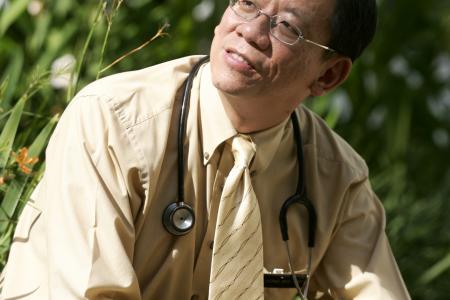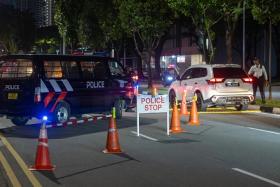Doctor who survived Sars warns against complacency in tackling Mers
Doc who survived Sars infection says Mers epidemic scares him
The last time an epidemic hit Singapore, this doctor ended up becoming a patient and had to fight for his life.
Now, Dr Leong Hoe Nam, 44, is sure that the Middle East respiratory syndrome (Mers) can - and will - come to Singapore and warns that we need to be prepared and avoid complacency.
Mers has already claimed 24 lives in South Korea, which has close to 6,000 people in quarantine.
On Thursday, Thailand confirmed its first case of Mers.
Dr Leong, an infectious diseases physician, survived a severe acute respiratory syndrome (Sars) infection in 2003.
The Sars outbreak in Singapore that year shook the nation, infecting 238 people and claiming 33 lives here.
"When I first heard about Mers, it was like deja vu," said Dr Leong, who spent two and a half weeks in an isolation ward at Frankfurt University Hospital, after Singapore authorities alerted Germany about his condition.
He developed a fever while in New York for a conference and was taken off the plane at Frankfurt when he was on the way back to Singapore.
Sars had only just surfaced then and it was not understood, so Dr Leong was not quarantined earlier.
On hearing about Mers, he said: "I pictured the return of the Sars episode, with quarantines, restrictions at hospitals and businesses and the economy being hit.
"They were thoughts of fear, of lying in the hospital seeing people fully suited, being unable to breathe."
He contracted Sars while treating the first Sars patient in Singapore.
Dr Leong recalled how, after he was infected, he spent days lying in the hospital in Frankfurt, unsure what the next day would bring.
"I didn't know if I was going to live to the next day and my life just flashed before me," he said.
"I thought I might never see my family again. No matter how I breathed, even with 100 per cent oxygen, there was not enough air.
"It was a scary sensation."
But he feels Singapore has learnt from Sars and has come out stronger.
"The Sars epidemic prepared us and we are now a far cry from what we were before," he said.
"We have better facilities, training and essential protocol in place. The only mistake we can make, if anything, is human error."
He stressed that Singapore has a total defence approach to Mers, with three main lines of defence.
He said: "We have our hospitals with good infection control. We have medical professionals fully aware and prepared. And we need to have cooperative citizens."
Dr Leong is confident that Singapore's health-care system is ready to tackle the threat, but he urged Singaporeans to follow protocol to prevent an epidemic.
"Singapore was the first to emerge out of the Sars epidemic," he said.
"But if we are complacent, if everyone is selfish, then the country will be doomed. That is the honest truth."
Yet, he said he is sure there will be some people who choose to put others at risk.
"I am very sure that will happen," he said.
"It can be just one person out of the five million, but they don't realise that it will cause a huge ripple effect.
"It is very selfish, because it is never just about ourselves but the people around us."
INCONSIDERATE
Dr Leong believes that Singapore needs to plan for these "cowboys" - people who behave inconsiderately.
"If we fail to plan for failure, then we plan for absolute failure," he said, rephrasing a quote by Benjamin Franklin, one of the founding fathers of the United States.
"Hence, we should plan and anticipate that there will be some people who will not cooperate."
He added that the solution to contain the spread is simple, if everyone cooperates.
"Sars is transmitted easily, but Mers doesn't transmit so well," he said.
"The surgical mask is like a condom. If everyone wears it for 14 days, transmission will stop."
Prime Minister Lee Hsien Loong said last Wednesday while visiting the Communicable Diseases Centre at Tan Tock Seng Hospital that it is only a matter of time before Mers reaches our shores.
Said the PM: "We must assume that it can come and will come because we are so interconnected. Our neighbours have had cases... So for us, it's a matter of time.
"And when it happens, I wanted to be quite sure that our medical facilities, our medical staff, the hospitals... are ready.
"They know how to deal with it, they don't fumble and we can contain it and put a stop to the disease in Singapore as quickly as we can."
Dr Leong expressed the same sentiments, citing greater public education as key to preventing a widespread epidemic here.
He said: "PM Lee set the tone right. We need people to know what Mers is.
"All of us need to know our enemy to fight it together."
It can be just one person out of the five million, but they don't realise that it will cause a huge ripple effect. It is very selfish, because it is never just about ourselves but the people around us.
- Dr Leong (above), on those who would choose to put others at risk of Mers
Reduce your risks
The Ministry of Health (MOH) said the public should still refer to its health advisory dated June 9.
The advisory states that the World Health Organisation (WHO) does not recommend the application of any travel or trade restriction to areas affected by Mers.
- But to reduce the risk of exposure, MOH advises Singaporeans travelling to affected areas to adopt the following precautions when overseas:
- Observe good personal hygiene
- Practise frequent hand washing
- Consider wearing a surgical mask in crowded places
- Avoid contact with camels and other live farm or wild animals
- Adopt good food safety and hygiene practices and avoid consuming unpasteurised milk, undercooked meats, raw fruits and vegetables or unsafe water
- Avoid visiting health-care institutions in the Middle East and South Korea, unless it is necessary
Singaporeans who have returned from a Mers-affected area should monitor their health closely for two weeks.
They need not self-quarantine upon their return if they have no symptoms of illness.
However, they should wear a surgical mask and seek medical attention promptly if they become unwell with fever and cough, and if they had recent travel history (within two weeks) to any areas reporting human cases of Mers.
They should inform the doctor of the areas they had travelled to.
Truthful declaration of travel history is important.
They may also be isolated for observation and further investigation, which may take up to 48 hours.
As the situation is evolving, MOH will provide updates should there be any further measures implemented according to our public health risk assessments.
Get The New Paper on your phone with the free TNP app. Download from the Apple App Store or Google Play Store now



